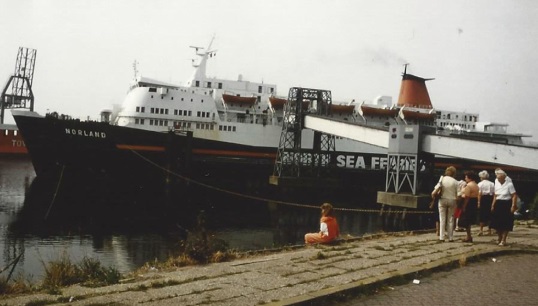
Working with the US Masters, Mates & Pilots union, Nautilus International has gained the ear of the NATO defence alliance – and the two unions have some powerful points to make about the risks of neglecting national Merchant Navies. Sarah Robinson reports
Last year saw the 75th anniversary of the North Atlantic Treaty Organization (NATO) – an alliance in which an attack on one member state is treated as an attack on all, so members must go to each other's defence.
The occasion prompted Nautilus Federation affiliate unions based in NATO member states (see panel) to issue a press release drawing attention to the importance of the Merchant Navy in times of conflict.
This led to an invitation to address the NATO Transport Group in Brussels in November 2024, and the speakers were Nautilus International general secretary Mark Dickinson and Don Marcus, president emeritus of the Masters, Mates & Pilots (MM&P) union.
'It struck us that in this time of heightened global tensions, with all sorts of wars and arenas of conflict breaking out, this was bringing the NATO alliance into sharp relief,' Mr Dickinson said. 'We wanted to highlight that NATO's commitment to Article Five of its founding treaty – an injury to one is an injury to all – was undermined by declining mercantile marine capability.'
NATO member states and Nautilus Federation unions
The following countries are members of the NATO defence alliance. Countries are given with the year each one joined the alliance. Those highlighted have at least one maritime trade union which is an affiliate of the Nautilus Federation.
|
Albania Belgium Bulgaria Canada Croatia Czechia Denmark Estonia |
Finland France Germany Greece Hungary Iceland Italy Latvia |
Lithuania Luxembourg Montenegro Netherlands North Macedonia Norway Poland Portugal |
Romania Slovakia Slovenia Spain Sweden Türkiye United Kingdom United States |
Sources: www.nato.int and www.nautilusfederation.org
Following their presentation, Mr Dickinson and Mr Marcus pledged to commission a detailed study showing the current state of the Merchant Navy in several NATO member states and the way this affects defence capabilities.
The findings of this study have now been published in a report titled NATO Member States’ National Merchant Fleet and Seafarers, and the report is summarised below.
The strategic importance of merchant fleets
Merchant fleets are the lifeblood of global trade, with approximately 90% of goods transported by sea. Beyond their economic significance, these fleets play a pivotal role in national security. During wartime or emergencies, civilian merchant vessels are indispensable for military logistics, troop transport, and humanitarian missions. Their versatility allows them to be repurposed as hospital ships, munitions carriers, or even aircraft transporters.
However, NATO's merchant fleet is shrinking. As of 2023, NATO member states collectively owned 16,916 propelled seagoing merchant vessels of 100 gross tonnes and above, representing a mere fraction of the global fleet. This decline is compounded by the widespread use of flags of convenience (FOCs), which enable shipowners to register vessels in countries offering lax regulations, tax benefits, and cheaper labour. While economically attractive, this practice erodes the strength of national registers, weakens flag-state responsibilities, and increases reliance on foreign crews.
Flags of convenience: a threat to maritime sovereignty
FOCs pose significant risks to NATO's maritime security. By allowing shipowners to obscure vessel ownership and accountability, FOCs facilitate illegal activities such as smuggling, human trafficking, and environmental violations. They also dilute regulatory authority, making it difficult for flag states to enforce safety, labour, and environmental standards.
The case of the Eagle S, a vessel linked to Russia's 'dark fleet' and accused of severing undersea cables between Finland and Estonia, highlights the vulnerabilities inherent in FOC practices. The ship's opaque ownership and frequent reflagging allowed it to evade scrutiny, underscoring the systemic risks posed by FOCs. Such incidents demonstrate how FOCs can be exploited for hybrid warfare, threatening NATO's infrastructure and collective security.
The decline of national seafarers
The shortage of qualified seafarers is another pressing concern. NATO member states collectively account for only 22.24% of the world's seafarers, with many nations experiencing a steady decline in their maritime workforce. For instance, the United Kingdom saw its pool of British seafarers employed on UK-registered ships plummet from 108,723 in 1975 to just 15,666 by 2000. Similarly, Norway and Greece have witnessed significant reductions in their maritime workforce, with foreign crews increasingly filling the gap.
This reliance on international labour poses challenges during crises. In wartime, ships with crew members from adversarial nations may face restrictions or be denied access to NATO ports. The logistical complexities of replacing foreign crews, especially during airspace closures, further exacerbate the problem. Without a robust pool of national seafarers, NATO's ability to crew its merchant fleet and sustain operations during emergencies is severely compromised.
Economic incentives and policy failures
Despite the critical role of merchant fleets, existing policies and subsidies have largely failed to reverse their decline. Maritime incentives such as tonnage tax schemes have had limited success in retaining national flags and boosting seafarer employment. In the UK, the tonnage tax introduced in the year 2000 initially increased the number of UK-registered ships but failed to deliver long-term growth or significantly improve employment prospects for British seafarers.


Similarly, Greece's pioneering tonnage tax system, designed to reduce flagging out, has struggled to compete with the fiscal advantages offered by rival shipping centres. As a result, over 87% of Greece's fleet capacity is registered under foreign flags, primarily FOCs. Norway's creation of the Norwegian International Ship Register (NIS) in 1987 helped retain its shipping industry but also led to a reliance on foreign labour, with most positions on NIS-registered ships now held by non-Norwegians.
These examples highlight the need for a strategic overhaul of maritime policies. State aid must be directly linked to national policy objectives such as growing the national fleet and ensuring a minimum share of national seafarers on subsidised ships. Without such reforms, subsidies risk perpetuating the status quo rather than fostering resilience and competitiveness.
Recommendations for NATO member states
To address these challenges and strengthen NATO's maritime backbone, the report proposes several recommendations:
Policy reforms and coordinated governance
NATO member states should enhance targeted state aid to incentivise shipowners to support national policy objectives. This includes linking subsidies to training and employment outcomes, restricting eligibility to vessels under national registries, and developing a coordinated governance framework to ensure sustainable maritime employment and competitiveness.
Strengthening the 'genuine link'
The principle of a genuine link between ships and their flag states must be reaffirmed and enforced, aligning with the United Nations Convention on the Law of the Sea. Efforts should be made to combat fraudulent ship registrations and close gaps exploited by FOCs.
Investment in maritime capabilities
Member states must increase investment in their merchant fleets and maritime professionals. This includes boosting the number of qualified national seafarers, enhancing maritime education and training, and developing strategies to retain and attract talent in the sector.
Enhancing data collection and analysis
Improved data collection methods are essential to address fragmentation in ship ownership and registration. Comprehensive data will enable informed policy decisions and strategies for the maritime sector.
Strengthening NATO's maritime resilience
Contingency plans should be developed to overcome reliance on foreign-flagged ships and FOCs for military logistics and supply chains. Enhanced cooperation among member states can pool maritime resources and capabilities, ensuring readiness during crises.
A call to action
The shrinking NATO merchant fleet and declining pool of national seafarers represent a significant threat to the alliance's operational readiness and maritime security. By investing in their merchant fleets, curbing the use of FOCs, and implementing the recommendations outlined in this report, NATO member states can reverse these trends and build a secure, resilient maritime sector.
Nautilus is working to ensure this call to action is heard as widely as possible by placing the report before decision-makers at national and international levels. For example, the findings have been reported to the European Commission, as 23 of the 27 EU countries are in the NATO alliance. The EU Sectoral Social Dialogue Committee for Maritime Transport was alerted to the study at its meeting in May this year, and Nautilus is working to ensure this is a full agenda item at the group's next session in October.
Copies of the report have been shared with the NATO Shipping Centre (NSC) and Allied Maritime Command, based in London. NSC is the primary point of contact for the exchange of merchant shipping information between NATO's military authorities and the international shipping community.
In addition, Nautilus Federation affiliate unions based in NATO member states are sharing the report with their national administrations and contact networks. As part of this effort, Nautilus International is working to ensure the British and Dutch governments see and act on the report, as well as sharing the document with industry bodies such as the UK Chamber of Shipping and Maritime UK.
• The Nautilus/MM&P report NATO Member States’ National Merchant Fleet and Seafarers is available for download free of charge here on the Nautilus International website
Tags
More articles
Government must secure the future of maritime to meet defence ambitions, warns Nautilus
Nautilus calls for urgent investment in maritime backbone following UK Strategic Defence Review
US Federal Maritime Commission launches investigation into flags of convenience
The United States Federal Maritime Commission has opened an investigation into whether the vessel flagging laws, regulations, or practices of foreign governments create shipping conditions that have a negative impact on US foreign trade.
